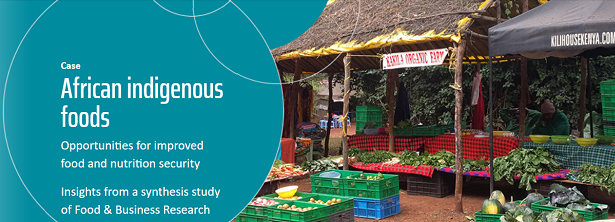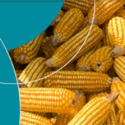African indigenous foods: Opportunities for improved food and nutrition security

What is the potential of local and indigenous foods to contribute to food and nutrition security, as well as economic empowerment, of poor and marginalised farmers and consumers in Sub Saharan Africa? This is the key question explored in a synthesis paper that has recently been produced discussing Research for Development insights and innovations regarding these foods. Indigenous foods are plant and animal-based foods that are naturally existing and produced in specific locations and consumed as part of traditional diets. For the potential of these foods to be realised, better knowledge is needed on the production, processing and marketing opportunities of valuable indigenous crops and foods. In addition, policymakers need to come on board. They play an important role in promoting value chains that are inclusive of poor, rural and female farmers and producers who aspire to bring these nutritious indigenous foods to a wider market.
This paper “Pathways to improved food and nutrition security of the poor: the promise of Africa indigenous foods and technologies” is the second thematic publication of a larger series of publications commissioned by NWO-WOTRO, together forming a synthesis study of the Global Challenges Programme (GCP) and Applied Research Fund (ARF) projects under the Food & Business Research programme, executed by Daniëlle de Winter and Ellen Lammers.
Seven transdisciplinary projects set in Sub Saharan Africa researched the production, processing and marketing challenges and opportunities of indigenous and other plants, fermented dairy foods, and infant formulae made from local plant and animal resources. These projects formed the basis of this synthesis. The paper addresses different benefits and challenges that come with the promotion of local and indigenous foods.
On a social level, two major benefits are identified in the paper. Firstly, these healthy and nutritious foods are affordable for the poor, and they can empower the producers and processors, who often are women. Because of the traditional knowledge attached to indigenous foods, their promotion may also enhance respect for people’s cultural identities. The major challenge to realising these social benefits is a lack of scientific knowledge on the nutritional value of many indigenous foods, as well as on effective processing and preserving technologies. Several of the research projects contributed to these challenges. For example in Zambia, Kenya and Benin, the nutritional value of traditionally consumed fermented foods and over 300 edible plants, vegetables, cereals, seeds and animal resources were tested and documented. In Zambia a traditional fermented milk product was used as an experiment to treat babies that were severely malnourished. In Kenya, new preservation techniques developed for indigenous vegetables increased not only their shelf life but also their nutritional value.
On an economic level potential benefits were discovered in the sphere of improvement of livelihoods of small-scale farmers and entrepreneurs who grow, process and market local and indigenous foods. Women in Kenya and Benin gained a higher and more regular income by growing and processing these foods. There are moreover many opportunities for collaboration for improved value chain governance, for instance with farmer cooperatives, women’s organisations, youth groups, community seed banks, or consumer organisations. At the same time challenges are considerable. One bottleneck for small farmers who aspire to upscale their production beyond the household and informal market, is a lack of approved and reliable production and processing technologies required for quality consistency. The research insights contributed to better processing techniques of parboiled rice in Benin and vegetable drying in Kenya. Another bottleneck is the lack of certification of most indigenous crops and foods. Two projects reached important milestones by working closely with government agencies: in Benin, a newly developed infant formula was certified and is now for sale in supermarkets; in Uganda, indigenous vegetable seeds were granted improved legal recognition. High marketing potential, however, also implies a risk. The opportunities for small farmers and entrepreneurs to upscale their indigenous foods businesses may well be hijacked by more powerful commercial companies. The formalisation of value chains can cause another trade-off that needs to be addressed upfront: product prices of indigenous foods may increase, which makes these nutritious foods less affordable for the poor.
On an environmental level, indigenous foods have the potential to improve environmental sustainability by contributing to agrobiodiversity, strengthening climate resilience and because of often lower natural resource requirements compared to more commercial and intensively farmed crops. Because indigenous vegetables can be harvested more times per year compared to many other crops, they support the resilience of farmers who, due to climate change impacts, are more often faced with failed harvests. Several research projects gained relevant insights into the use of organic fertilisers and pest management tools, water saving techniques, or the conservation of local forest resources. However, potential ecological benefits of indigenous crops deserve more research investments, particularly while local farmers’ know-how on growing and preserving these crops is on the decline.
This synthesis also showed that urban consumers in African cities are progressively buying indigenous and traditional food products, especially if these have proven health benefits. Moreover, the growing worldwide market for organic and health foods also suggests attractive business opportunities.
To capitalise on all these opportunities, indigenous foods need to become part of policymaking. National policymakers in the research project countries showed interest especially when there were positive market prospects. Yet because ’money talks’, the project results stress that in liaising with policymakers, critical questions must be raised about who will benefit from the promotion of indigenous foods: smallholders or commercial producers, women or men, rural or urban consumers. Also, careful selection of the best intervention is needed: using formal versus informal value chains, fostering production of indigenous foods for the rural or the urban market, for domestic consumption or for export. Openly and critically discussing the political and market dynamics and trade-offs is vital to ensuring that the promotion of indigenous foods will first and foremost benefit the food and nutrition security of the poor and marginalised.
Downloads
- Download the full paper “Pathways to improved food and nutrition security of the poor: the promise of Africa indigenous foods and technologies“
- Download the executive summary “African indigenous foods – Opportunities for improved food and nutrition security“
Authors: Dr Francesco Rampa, Dr Ellen Lammers, Dr Anita Linnemann, Dr Sijmen Schoustra and Daniëlle de Winter.







Hi Nicole, Interesting study. Since 8 years we are also working on the different applications of Moringa (Ethiopia, South Africa, Kenya, Uganda). Would be happy to learn more from the researchers and share info if required. Best Regards, Aart
Thank you for your reaction, Aart. Your initiative may be of interest to other stakeholders in the food & nutrition security sector indeed. They are kindly invited to visit your website. You can also look at the the specific project pages of the different research consortia on our website too, for content and contact details: https://knowledge4food.net/research-projects/